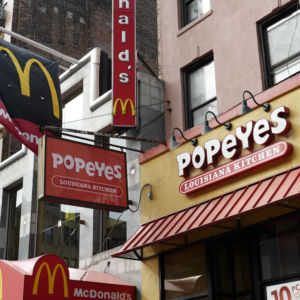The Department of Labor (DOL) withdrew Wednesday from an Obama-era rule which critics argue put unnecessary burdens on franchises.
Former President Barack Obama oversaw significant changes to labor law during his time in office. The business community expressed particular concern over changes made to the joint-employer standard. The standard determines whether an employer is responsible for the employees and labor liabilities of a company it contracts with.
Employers take on a lot of legal burdens and costs when they become joint-employers. The National Labor Relations Board (NLRB) brought about the new standard by changing how it ruled on those cases. The Department of Labor (DOL) announced its intent to upend the new standard in a statement.
“U.S. Secretary of Labor Alexander Acosta today announced the withdrawal of the U.S. Department of Labor’s 2015 and 2016 informal guidance on joint employment and independent contractors,” DOL said in a statement. “Removal of the administrator interpretations does not change the legal responsibilities of employers under the Fair Labor Standards Act and the Migrant and Seasonal Agricultural Worker Protection Act.”
The updated standard could potentially impact any group of businesses that contract together. Franchises were of particular concern since their business model relied on large corporations contracting with many small businesses. McDonald’s, for example, is primarily made up of many independently-owned businesses that contract with a large corporation.
The business community has rallied against the updated standard since the beginning. Industry groups and business coalitions have testified during congressional hearings, launched media campaigns, and detailed the potential consequences in reports. The International Franchise Association (IFA) has been at the forefront of the opposition.
“We are pleased the DOL is taking first steps to undo this costly regulation created by the previous administration,” IFA public affairs vice president Matt Haller said in a statement provided to InsideSources. “That being said, we urge Congress to now recognize the uncertainty and unreasonable costs the NLRB’s decision has placed on franchise owners and take action to find a true permanent solution.”
The joint-employer standard used to be determined based on whether a company had direct control over the employees of the other. That control could be over things like wages, the hiring process, or scheduling. The new standard looked at indirect control, which critics argue is way too vague.
“Labor Secretary Acosta’s decision to rescind regulator guidance on independent contractor and joint employer rules is a positive sign this administration will reverse federal rules that needlessly hamstring worker and employer flexibility in the modern workplace,” Trey Kovacs, labor policy expert at the Competitive Enterprise Institute, said in a statement provided to InsideSources. “The labor rules at issue amounted to informal regulatory ‘dark matter’ that made it harder for people who want to be in business for themselves and punished large companies for contracting with smaller ones.”
The NLRB has argued the standard needed to be updated. The board has stated that the previous standard was outdated, and was defined by conflicting case law. It notes a new standard needed to be applied that fits better in the current economic landscape.
The board argued the “joint-employment jurisprudence [was] increasingly out of step with changing economic circumstances, particularly the recent dramatic growth in contingent employment relationships,” the Browning-Ferris decision stated. “This disconnect potentially undermines the core protections of the Act for the employees impacted by these economic changes.”
The NLRB revisited the joint-employer standard during a handful of labor dispute cases in recent years. The Browning-Ferris Industries case set the precedent for the new standard when it was decided in 2015. Feds declared Browning-Ferris a joint-employer with Leadpoint Business Services.

